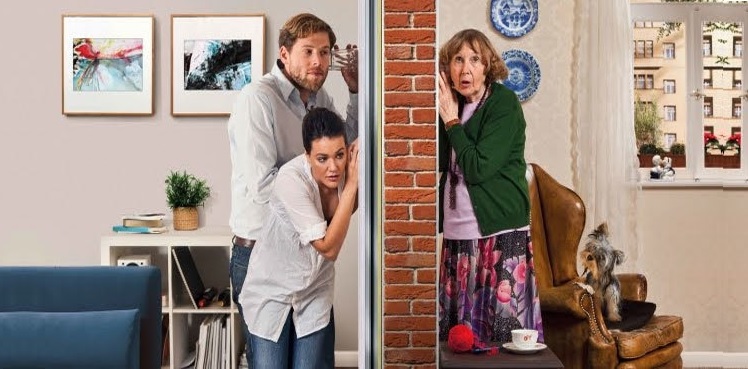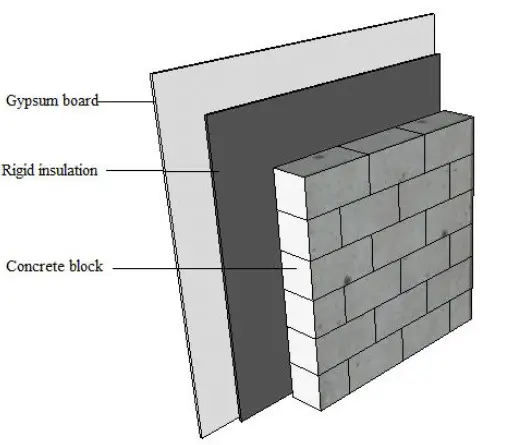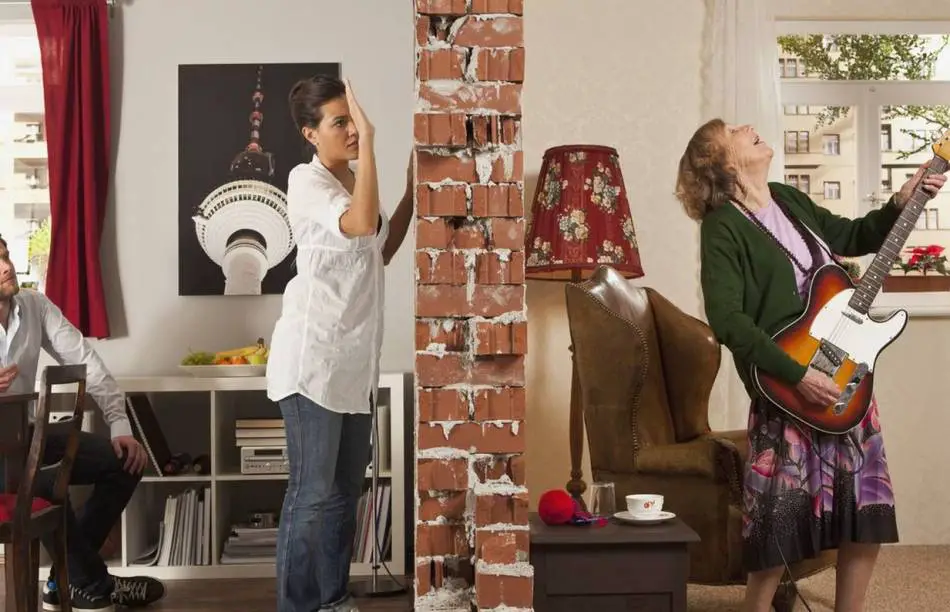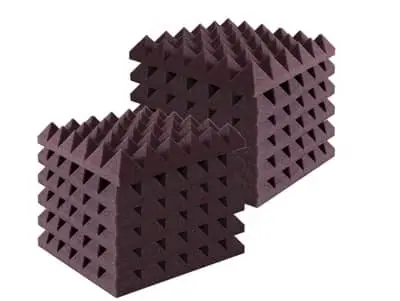Can Your Neighbors Hear You Through Concrete Walls?

The vast majority of apartments today have concrete walls. If you are one of those who likes to watch movies very loudly while alone at home, or you love to talk loudly, you might wonder, can neighbors hear you on the other side?
Although concrete walls are quite thick, this does not mean that sound does not pass through them. In this article, we’ll explain whether or not your neighbors can hear you through concrete walls and how to prevent it. So, let’s start!
Can Your Neighbors Hear You Through Concrete Walls? No, neighbors usually can’t hear through a concrete wall. Concrete walls can reduce sound penetration through a wall by more than 80% compared to wood or steel frame construction. However, sound can still pass through them. This depends on the noise level and how sensitive your neighbors are.
When living in an apartment that has concrete walls, it’s important to understand the limitations of soundproofing. While concrete is generally a good material for blocking sound, it’s not completely soundproofed.
Some sound waves can still travel through the walls, although it’s unlikely that your everyday activities, such as talking or dropping something, would be heard by your neighbors. We will explain this in more detail in the next section.
Can You Hear Through Concrete Walls?

As a homeowner, you may be curious whether sounds can travel through concrete walls. After all, maintaining a certain level of privacy and preventing your neighbors from overhearing your daily activities is important to most people.
While concrete walls are known for their durability and sturdiness, it’s not always the case that they can completely block sound.
The truth is that sound can pass through concrete walls, although the volume of the sound will play a role in how clearly it’s heard. To minimize the amount of sound that travels through walls, it’s important to take certain steps.
This may include filling in any cracks that may exist in the concrete and then adding thick coatings to the walls to enhance their soundproofing abilities.
While it’s unlikely that your neighbors will be able to hear your conversations or other activities through concrete walls, reducing the amount of sound that escapes can help you feel more secure in your home.
Related Article: Can You Soundproof A Room Without Damaging Walls?
How Soundproof Is Concrete?

When it comes to construction, concrete is a popular choice due to its durability and affordability, and it can reduce noise by more than 80%. It’s a versatile material suitable for various applications and often used in commercial and residential buildings. However, concrete is not completely soundproof.
Despite its reputation for strength and thickness, concrete does not provide the high level of sound insulation that many homeowners desire. This is because the soundproofing qualities of a material are not determined solely by its width but rather by its construction.
Choosing the right materials and minimizing sound transmission can create a more comfortable and peaceful living or working space. Below is a table with the STC rating of various types of concrete walls.
| Concrete Type | STC Rating |
|---|---|
| Poured Concrete (8 inches) | 50-55 |
| Concrete Masonry Unit (8 inches) | 45-50 |
| Insulated Concrete Forms (8 inches) | 50-60 |
| Concrete with Mineral Wool Insulation (8 inches) | 55-60 |
Note: STC ratings refer to the ability of a material to reduce airborne sound transmission, with higher numbers indicating better soundproofing capabilities.
3 Ways To Soundproof Concrete Walls

Soundproofing your walls so your neighbors can’t hear you can be expensive and time-consuming, especially when it comes to concrete walls. However, there are several affordable options that you can consider to soundproof your walls without breaking the bank.
Acoustic foam or absorbing wall panels might be your best option if you have a tight budget. These materials can be easily installed and removed without damaging your walls, making them ideal for temporary solutions.
On the other hand, if you have a higher budget, you may want to consider investing in more permanent soundproofing solutions such as resilient channels or mass-loaded vinyl. These options can provide a higher level of soundproofing and are more effective in blocking out low-frequency sounds.
Related Article: Are Landlords Responsible For Soundproofing?
No matter which option you choose, it’s important to remember that there are many ways to soundproof a room and prevent your neighbors from hearing you. Here are 3 affordable ways that you can use to soundproof a concrete wall.
1. Use Acoustic Foam

Acoustic foam is a good solution if you’re dealing with noise problems in a space that has concrete walls. This acoustic foam can provide good soundproofing results but requires professional expertise or a significant amount of DIY knowledge.
However, adding acoustic foam lets, you enjoy a quieter environment with minimal renovation work. Just be sure to choose the right type of foam for your specific needs and budget.
2. Use Absorbing Wall Panels

> Buy Absorbing Wall Panels HERE <
If you’re looking for an effective way to reduce noise without causing damage to your walls, then noise-absorbing wall panels are the perfect option. They can be easily installed and removed, making them an ideal option for those renting an apartment or not in a position to make permanent changes to their living space.
These panels come in various materials, some designed to add a stylish touch to your room’s decor with different shapes and colors available.
Absorbing wall panels are designed to absorb sound waves and prevent them from bouncing around the room. The material used to make them can vary from foam to insulation, providing an excellent noise-reduction solution that is both functional and aesthetically pleasing.
3. Use Home Furniture for Soundproofing

Consider using your home furniture if you’re looking for an easy, cost-effective way to soundproof your concrete wall. When sound waves bounce off hard surfaces, they can create an echo or amplification effect, making the noise even louder. Adding soft furnishings to your space allows you to absorb some sounds and reduce noise.
To achieve this, add furniture to your space, especially soft furniture like couches, rugs, and curtains. If you have a shared concrete wall with a noisy neighbor, consider putting a bookshelf or other sound-absorbing barrier on that wall. This can make a significant difference in the amount of noise that enters your space.
It’s important to note that the effectiveness of this method depends on the size of your room. If you’re dealing with very loud noises or have a large space, you may need to combine this method with other soundproofing techniques.
However, using furniture as soundproofing is a great starting point for creating a quieter and more comfortable environment in your home or apartment.
Here you can see a video that explains how to soundproof a wall from noisy neighbors:
Related Article: How Does Noise Cancelling Foam Work?
FAQ: People Also Ask
Is it normal to hear your Neighbours through the walls?
Hearing your neighbors through the walls is not normal, especially if you talk normally and don’t yell. Concrete walls can block up to 80% of the sound, preventing you from hearing the person on the other side. If your walls are thin, use some soundproofing material to block the sound.
Do concrete walls absorb sound?
Concrete walls can absorb sound, but they can’t completely block it. When sound waves hit a concrete wall, some of the energy is absorbed by the wall and converted into heat. The rest of the energy is reflected back into the room, but the absorption of some of the sound reduces the overall noise level.
How much sound does concrete absorb?
Concrete is not a very effective sound absorber, with a sound absorption coefficient of around 0.02, indicating that it reflects about 98% of the sound energy that hits its surface. However, the weight and density of the concrete play a role in its sound insulation properties.
Is concrete more soundproof than wood?
Regarding soundproofing, the concrete floor outperforms the wood floor in a wider range of low frequencies up to 125 Hz and at higher frequencies above 2 kHz (except for the Hammer). However, in the mid-frequency range, the bare wood floor provides approximately 10 dB better soundproofing than the concrete floor.
Final Thoughts
Concrete walls should prevent sound from transmitting through, and your neighbors shouldn’t be able to hear what you are saying inside your 4 walls. However, if you are concerned about your privacy or experiencing noise from your neighbors’ side, there are some ways to improve the soundproofing of your concrete walls.
You may consider installing acoustic foam or absorption panels or adding more furniture to absorb sound. Another option is to fill any gaps or cracks in the wall and apply thick coatings to the surface. If you still experience noise issues, it may be worth contacting your building management for further assistance.
